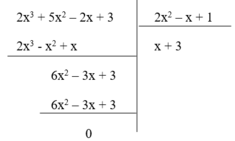Hãy nhập câu hỏi của bạn vào đây, nếu là tài khoản VIP, bạn sẽ được ưu tiên trả lời.

Bài 1:
Ta có: \(5x^3-3x^2+2x+a⋮x+1\)
\(\Leftrightarrow5x^3+5x^2-8x^2-8x+10x+10+a-10⋮x+1\)
\(\Leftrightarrow a-10=0\)
hay a=10

Bài 4:
c: Ta có: \(\dfrac{6x^3-x^2-23x+a}{2x+3}\)
\(=\dfrac{6x^3+9x^2-10x^2-15x-8x-12+a+12}{2x+3}\)
\(=3x^2-5x-4+\dfrac{a+12}{2x+3}\)
Để phép chia trên là phép chia hết thì a+12=0
hay a=-12

a) \(A\left(x\right)=2x^3-x^2-x+1\)
\(=\left(2x^3-4x^2\right)+\left(3x^2-6x\right)+\left(5x-10\right)+11\)
\(=\left(x-2\right).\left(2x^2+3x+5\right)+11\)
Vậy \(A\left(x\right):B\left(x\right)=2x^2+3x+5\) dư \(11\)
b) Để \(A\left(x\right)⋮B\left(x\right)\) thì \(11⋮B\left(x\right)\)
\(\Rightarrow x-2\inƯ\left(11\right)=\left\{\pm1;\pm11\right\}\)
\(\Rightarrow x\inơ\left\{13;3;2;-9\right\}\)

a: \(A=m^6-6m^5+10m^4+m^3+98m-26\)
\(=m^6-m^4+m^3-6m^5+6m^3-6m^2+11m^4-11m^2+11m-6m^3+6m-6+17m^2+81m-20\)
\(=m^3-6m^2+11m-6+\dfrac{17m^2+81m-20}{m^3-m+1}\)
b: \(C=m^3-6m^2+11m-6=\left(m-1\right)\left(m-3\right)\left(m-2\right)\) luôn chia hết cho 6
b: Để đa thức dư bằng 0 thì 17m^2+81m-20=0
=>m=-5 hoặc m=4/17


Bài 5.5:
\(\left(2x-3\right)\left(x+1\right)+\left(4x^3-6x^2-6x\right):\left(-2x\right)=18\)
\(\Leftrightarrow\left(2x^2+2x-3x-3\right)+2x\cdot\left(2x^2-3x-3\right):\left(-2x\right)=18\)
\(\Leftrightarrow2x^2-x-3-2x^2+3x+3=18\)
\(\Leftrightarrow2x=18\)
\(\Leftrightarrow x=\dfrac{18}{2}\)
\(\Leftrightarrow x=9\)

Lời giải:
$2x^3-x^2+4=2x^2(x+1)-3x(x+1)+3(x+1)+1$
$=(x+1)(2x^2-3x+3)+1$
Với $x$ nguyên, để $2x^3-x^2+4\vdots x+1$ thì $1\vdots x+1$
$\Rightarrow x+1\in \text{Ư(1)}$
$\Rightarrow x+1\in\left\{\pm 1\right\}$
$\Rightarrow x\in\left\{-2; 0\right\}$

Lời giải
Ta có

Vì phần dư R = 5 ≠ 0 nên phép chia đa thức 3 x 3 – 2 x 2 + 5 cho đa thức 3x – 2 là phép chia có dư. Do đó (I) sai
Lại có

Nhận thấy phần dư R = 0 nên phép chia đa thức ( 2 x 3 + 5 x 2 – 2x + 3) cho đa thức (2 x 2 – x + 1) là phép chia hết. Do đó (II) đúng
Đáp án cần chọn là: D